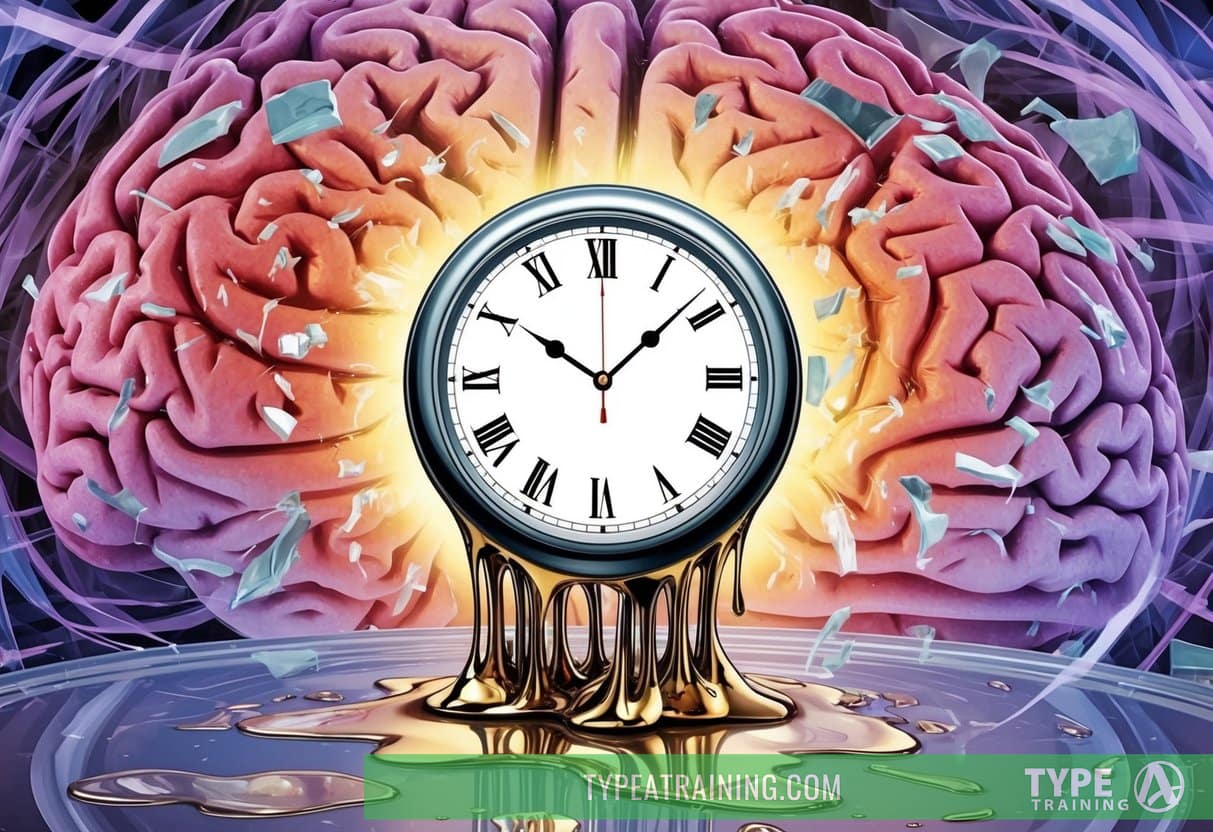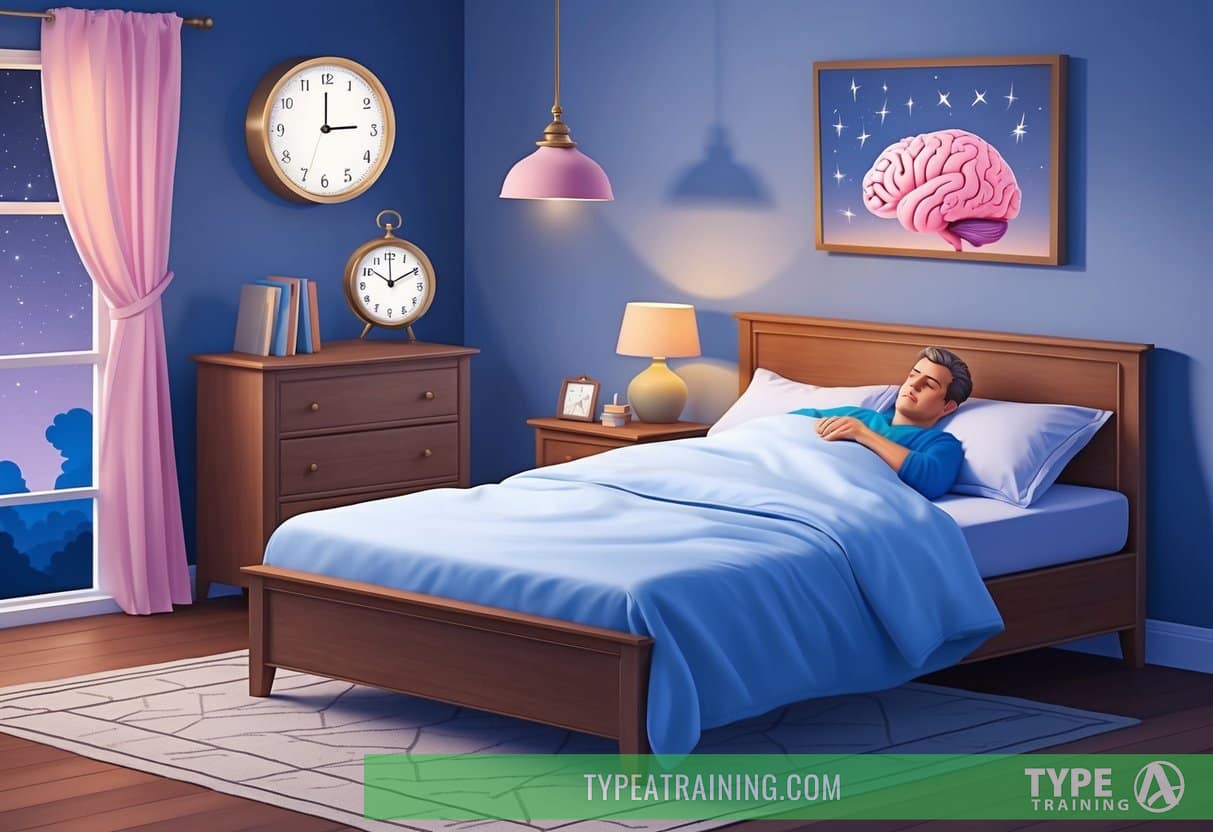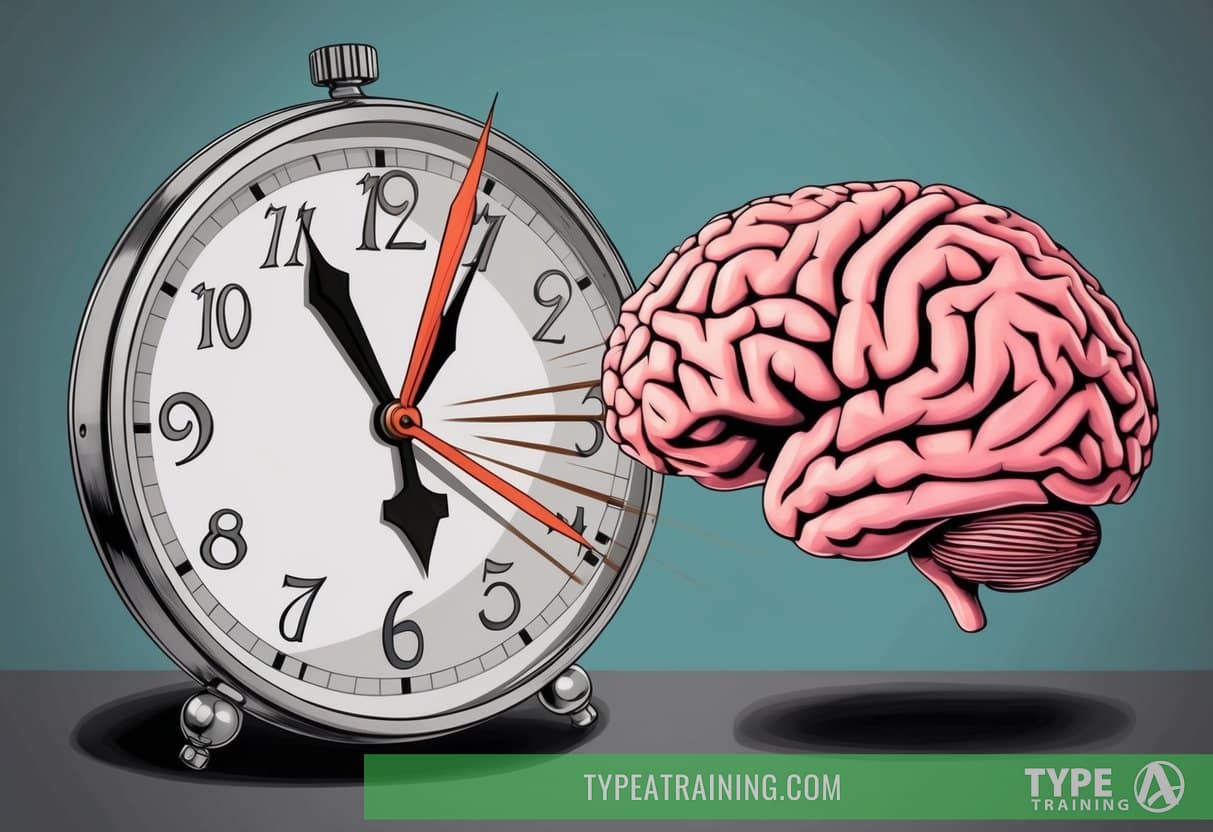Chronic trouble sleeping may accelerate the aging of your brain. Research has shown that poor sleep habits can lead to a brain age that is several years older than your actual age.
This connection between sleep quality and brain aging underscores the importance of getting a good night’s sleep.

When you have consistent sleep issues, it can contribute to cognitive decline.
Popular posts:
Such disturbances can affect your overall brain health, potentially impacting memory and cognitive performance.
Fostering healthy sleep habits is not just about rest; it’s a critical component of mental well-being.
Addressing sleep problems is a modifiable risk factor for maintaining your cognitive health. By paying attention to your sleep quality and making necessary changes, you can help protect your brain as you age.
Simple strategies can make a significant difference in how your brain ages.
Key Takeaways
- Poor sleep speeds up brain aging.
- Sleep quality affects cognitive performance.
- Improving sleep habits can reduce risks.
The Science of Sleep and Brain Aging

Research highlights the delicate relationship between sleep quality and brain aging.
Poor sleep can accelerate changes in brain structure and function, potentially increasing the risk of cognitive decline and dementia.
Understanding Brain Health and Aging
Your brain undergoes various changes as it ages.
Dementia and reduced cognitive function are common concerns.
Neuroimaging and brain scans are tools that researchers use to study these changes, revealing signs like amyloid-β deposition and white matter hyperintensities.
Studies suggest that genetics and inflammation increase vulnerability to brain aging.
The brain’s glymphatic system, critical in clearing waste, including amyloid-β, may also play a role.
Sleep appears essential in maintaining this system’s efficiency, impacting brain health and potentially delaying age-related decline.
Sleep Disorders and Cognitive Function
Disrupted sleep patterns are linked to faster brain aging.
Conditions like insomnia or sleep apnea may lead to changes in brain structure.
Sleep problems are associated with increased brain age and symptoms resembling cognitive decline.
You may face increased risk factors for cognitive issues if sleep disturbances are persistent.
Machine learning helps researchers understand how chronic sleep disorders can affect brain functions.
Regular sleep patterns support the brain’s restorative processes, which can maintain cognitive health and reduce the likelihood of age-related problems.
The connection between sleep and brain health underlines the importance of addressing sleep disorders for cognitive resilience.
Impacts of Sleep Quality on Cognitive Performance

Sleep quality plays a critical role in maintaining cognitive performance. Understanding how poor sleep characteristics can lead to cognitive problems and exploring ways to improve sleep is vital for preserving brain health.
Consequences of Poor Sleep Characteristics
Poor sleep characteristics can significantly impact your cognitive performance.
Sleep deprivation is associated with impairments in memory and attention.
This can also lead to increased daytime sleepiness, making it difficult for you to concentrate and process information effectively.
Research indicates that insufficient sleep can harm your ability to perform daily tasks, cause cognitive symptoms like forgetfulness, and disrupt overall cognitive function.
These symptoms may worsen over time and increase the risk of long-term cognitive decline, highlighting the need to prioritize quality sleep in your routine.
Improving Sleep to Preserve Cognitive Health
Improving the quality of your sleep can help sustain cognitive health.
Implementing relaxation techniques such as meditation and deep breathing exercises can improve sleep quality by reducing stress levels.
Creating a consistent sleep schedule and a restful sleep environment can also contribute to better sleep.
Ensuring you routinely get enough sleep may prevent cognitive problems before they emerge.
You should aim for the recommended 7-9 hours of sleep per night, as this duration is linked to optimal cognitive performance and reduced risk of cognitive decline.
Making these adjustments could ultimately improve your daily functionality and long-term brain health.
Prevention and Management Strategies
Determining how to manage and prevent issues related to poor sleep can significantly impact your brain’s health. Key strategies include adopting healthy sleep habits and exploring medical and behavioral interventions. Understanding these approaches can help mitigate risks such as cognitive decline and dementia.
Adopting Healthy Sleep Habits
Implementing healthy sleep habits can play a critical role in protecting your brain health as you age.
A consistent sleep schedule is essential; aim to go to bed and wake up at the same time every day, even on weekends.
Achieving a sleep duration of 7-9 hours per night can improve mental health and reduce the risk of conditions like cardiovascular disease.
Consider creating a relaxing bedtime routine to signal to your body that it’s time to rest.
Techniques such as meditation or light stretching can reduce stress and prepare you for sleep.
Make your sleep environment conducive to rest by using blackout curtains and maintaining a comfortable room temperature.
Limiting caffeine and electronic device use before bedtime can also promote better sleep quality, thereby reducing the risk of insomnia or sleep fragmentation.
Medical and Behavioral Interventions
Exploring professional interventions may be necessary if sleep issues persist.
For those experiencing obstructive sleep apnea or snoring, treatments such as CPAP (Continuous Positive Airway Pressure) machines can maintain airway patency during sleep.
Seeking evaluation for insomnia with a sleep specialist can help identify underlying causes and appropriate therapies.
Cognitive-behavioral therapy for insomnia (CBT-I) is a non-drug treatment that has shown success in managing sleep problems by addressing the thoughts and behaviors affecting sleep.
Additionally, addressing modifiable risk factors like obesity and depression through tailored health initiatives can further improve sleep quality and reduce dementia risk in middle-aged adults.
Public health initiatives focusing on mental health and sleep hygiene awareness can provide valuable resources for managing long-term sleep issues.
Frequently Asked Questions
Sleep plays a crucial role in maintaining brain health. Poor sleep can impact brain aging and increase the risk of cognitive decline and age-related diseases. The following questions explore the connection between sleep and brain health.
How does sleep deprivation affect the aging process of the brain?
Sleep deprivation can lead to accelerated brain aging, making the brain appear older than its chronological age.
Difficulty falling or staying asleep is associated with increased signs of cognitive decline over time.
Research indicates that those with poor sleep hygiene in midlife may show a brain age up to 2.6 years older than their peers.
What are the long-term effects of insomnia on cognitive decline?
Insomnia can lead to long-term cognitive issues, including memory impairment and decreased thinking skills.
Chronic sleep issues may put individuals at a higher risk for conditions linked to cognitive decline.
Studies have shown a correlation between persistent poor sleep and cognitive problems in later life, emphasizing the importance of managing sleep disorders early.
Can chronic sleep disturbances accelerate neurological aging?
Yes, chronic sleep disturbances can accelerate neurological aging.
Regular disruption in sleep patterns can contribute to faster brain atrophy.
This effect is more pronounced in individuals who experience consistent poor sleep quality, such as frequent awakenings or difficulty sleeping, leading to an older brain age compared to those with regular sleep patterns.
Is there a correlation between sleep quality and brain health as we age?
There is a strong correlation between sleep quality and brain health.
As we age, maintaining good sleep quality helps support cognitive function.
Poor sleep quality has been linked to a decline in mental faculties, highlighting the need to address sleep issues to promote healthier brain aging and reduce the risk of age-related cognitive deterioration.
What impact does disrupted sleep have on the risk of age-related brain diseases?
Disrupted sleep increases the risk of developing age-related brain diseases like dementia.
Consistent issues with sleep can lead to brain conditions developing earlier than typical.
Studies suggest that continuous sleep problems can hasten the progression of brain disorders, highlighting the need for interventions to improve sleep stability and quality.
How does the length and quality of sleep influence the rate of brain aging?
Both the length and quality of sleep significantly influence brain aging.
Sufficient and restorative sleep helps preserve brain structure and function. Meanwhile, inconsistent or poor-quality sleep may accelerate signs of aging in the brain.
Proper sleep contributes to maintaining cognitive faculties and delaying cognitive decline associated with aging.








